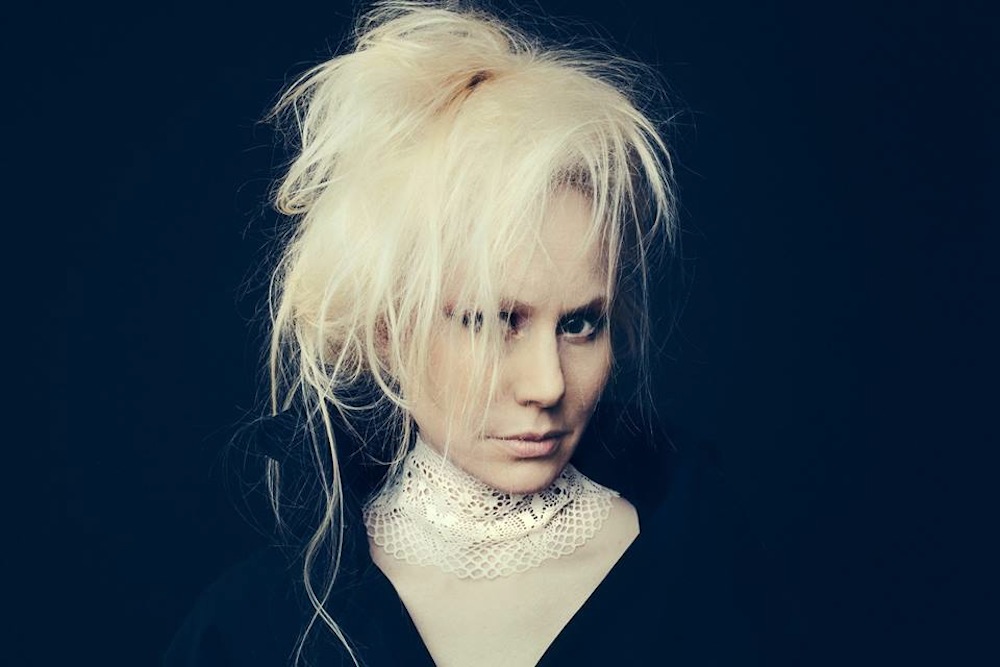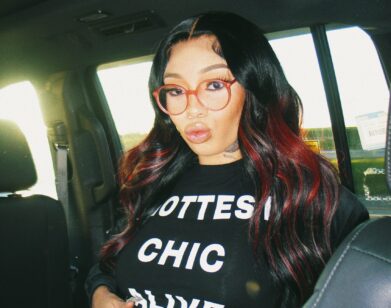Susanna’s Three Sides

ABOVE: SUSANNA. PHOTO COURTESY OF ANNE VALEUR.
For well over a decade, Susanna Wallumrød has written and recorded some of the most beautiful and inscrutable pop music in the world. Originally working under the moniker of Susanna and the Magical Orchestra, the Norwegian singer first drew international attention with albums that mixed original songs with a variety of unconventional covers. (Her versions of Dolly Parton’s “Jolene” and Joy Division’s “Love Will Tear Us Apart” are essential.) During the last 10 years—and simply under the name Susanna—she has released five evocative solo albums, the latest of which, Triangle, was released on Friday. Described as “soul music for lost souls,” the album comprises songs that examine and dissect popular notions regarding religion and spirituality, stitched together by piano, violins, horns, and Susanna’s otherworldly voice. It is, as the press materials describe it, a record “filled with magical omens, apocalyptic fires, black holes, and floodwaters that constantly threaten oblivion.”
During a recent visit to her hometown of Oslo, Norway, we sat down with Susanna to speak about Triangle and what it means to be a Norwegian artist. Later that night, she performed in an ancient church as part of the annual By:Larm festival.
T. COLE RACHEL: This album feels much more intimate and personal than anything else you’ve done.
SUSANNA: It is different from the other albums, mainly because I worked so much more by myself, just with my own recording gear. I started it in L.A. actually, in a really nice wooden hut in Echo Park. You can hear, on some of the recordings, that there are birds outside. They responded to my singing and playing and started to make more sounds immediately.
RACHEL: People forget how much of a nature experience you can have in L.A.
SUSANNA: Yeah, very. Almost even more than some places in Oslo. We tend to brag about how close we are to nature here with the woods and everything, but some parts of L.A. are so much more flourishing with trees and flowers and raccoons and coyotes on the street at night. It’s crazy.
RACHEL: Making a record always sort of represents its own specific journey and you don’t always know, when you start, where it’s going to end. Was that the case with Triangle? Did you have a clear idea of the kind of record you wanted to make going into it? Or did it reveal itself as the process went on?
SUSANNA: No, it was very much a process this time, due to many things. I didn’t have that much money to record and originally I was thinking about going to a studio with a lot of musicians and working big parts of the album out there. But when I didn’t have the financial situation worked out I was just like, “Okay, now I have all these songs and I have to start somewhere. Why not just do it myself?” So I ended up also doing all of the main parts by myself and building everything up from there. Everything that I added later—instruments, musicians, and people—originated from a starting point that I made by myself. That’s very different from the other things that I’ve done in the past, usually because I’ve always been in collaboration with a producer or other musicians. In the past it has always been about a dialogue, having someone there to talk things through with. “How are we going to do this? Where are we going now? Does this work?” I didn’t have that this time, so it was so frustrating. On my own I was like, “Aaaah, how am I’m going to figure out all this by myself?”
RACHEL: Sometimes you need someone else to just be like, “No.”
SUSANNA: Yes. And it gets hard to choose when you have so many options, but I was also figuring out my own limitations. There was a lot of recording stuff that I had to figure out along the way. I was like, “Okay, I want to do this. I want to achieve that kind of sound,” or “I want to do this and that”…and then you just meet your own limitations and have to deal with it somehow. There were times when it was super frustrating, when I thought that making this album would never end. I often felt lost inside of it.
RACHEL: Also, in terms of subject matter, a lot of the songs are about very big things—spirituality, apocalypse, etc.
SUSANNA: Yeah, that was definitely a part of what made it so tough.
RACHEL: I’ve always been fascinated about the ways in which we now address spirituality. I feel like for a certain generation of people, myself included, spirituality and religion are just not really talked about in a very intellectual way. It’s a hard subject to broach because it pushes so many different buttons.
SUSANNA: I think it is probably that way here, in Norway, as well. I generally think that people are much more spiritual than they are actually aware of. They have some sort of mindset about these things—the way they think about how we interact with other people and how it’s all connected. I think all people really have some sort of thoughts about this, but it gets very New Age-y to try and talk about it.
RACHEL: People often get to a certain age and they start to think about those things in a way that maybe they didn’t when they were younger: “What do I really think about god or a higher power?” Whereas, when you’re younger it’s easy to have these vague notions—like, “I believe in something but I don’t know what it is”—and be okay with not trying to define it.
SUSANNA: When you realize that this has to come to an end at some point…
RACHEL: Yeah, it’s the classic thing. Mortality makes everything come into focus. Were these ideas that you’d wanted to explore for a while?
SUSANNA: Yeah. The whole album began as a commissioned piece that I did for another festival, something I did together with a Norwegian folk musician. I was asked to write new music. It really started me in the direction of writing this album. A few of these ideas had actually been with me for years. I just collect ideas sometimes and then don’t have time to explore them, so they build up.
RACHEL: Did the process of making Triangle end up influencing a lot of your own ideas about spirituality and faith?
SUSANNA: Yeah, I think so, but I think that every album changes me somehow. Still, this has probably been more substantial. The process of making this record lasted for a really long time and I ended up with much more material than I’ve ever had for any previous record. I was very curious to see what would happen if I didn’t limit myself that much, so I was trying not to have any rules in my head about what type of record I was trying to make. I was very focused on just trying to let it be what it is and just feeling it—letting my intuition control every part of making the album, from the writing to the playing to the recording.
RACHEL: That’s the hardest thing to do, especially for artists who have made a lot of records, not to second-guess yourself. Being able to become un-self-conscious and get out of your own way and just let whatever needs to come out just naturally come out is a hard place to get to.
SUSANNA: Yeah, it’s very, very hard, and it doesn’t get any easier. It’s not like, “Oh, no I’ve learned it, and now I can do this every time, just be free.” No, it doesn’t work like that, but I think that taking the time to just let things happen is important. I had also a long frustrated period in the writing process where I was just like, “What am I going to do with all these different tracks? They’re all so different,” and “What can this be? Can this be like a normal song?” In the end I was just like, “No, it’s not going to be a normal song. I’m just going to let it be what it is.” When I figured that out things came a little bit more easily. I also continued to write after I started the recording process. I had never done that before. Like, “I’m going to let everything just be a part of this.” That means I wrote from 2010 when I first wrote “Triangle” right up until recording the album last year in 2015. It was stretched out over a really long time.
RACHEL: It’s interesting talking to you here in Oslo, your home city, while this festival is going on. I keep hearing people talk about what it means to be a Norwegian artist, or saying that something has a very Norwegian sensibility.
SUSANNA: There’s a Nordic tradition, I guess, but I’m not sure what that really means. I get a lot of questions like that—how does being from here and living here affect my music? We don’t have a very long history in Norway as far as the music business is concerned. We don’t really have many established pop artists that are recognized internationally or a specifically Norwegian sound or genre. I do think what we have here is an openness to try out new things and to blend types of music. Also, Norway is this small country and the musicians here are often all connected in some way. We can easily work across the genres and across the fields of music.
RACHEL: I feel like with Norway and Sweden, especially regarding pop music, there is a sort of openness to experimentation, or a willingness to embrace weirdness that doesn’t necessarily exist in American pop music.
SUSANNA: I think so as well. I can also see the differences between Sweden and Norway, for example, because you have so much pop music coming from Sweden, and jazz has been much more mainstream there. The Norwegian scene has been much more experimental.
RACHEL: A lot of people have told me, both here and in Sweden, that because the country is so small there is often this need to succeed mostly just in order to get out and play other places.
SUSANNA: Absolutely. From the time I released my first album, I was always trying to find ways to play out in the rest of the world, not just because you want other people to hear your music, but also because it’s really a necessity if you want to be a working musician. There are only four or five cities in this country that I can maybe play once a year, or something. I couldn’t make a living from that at all. It’s impossible. We don’t have that big of an underground music scene here so it’s heaven to visit other countries where there’s actually a lot of people interested in this kind of music. It’s great to make music that you love and have people appreciate it in the place where you live, but I think every musician ultimately wants to go out and see the world.
TRIANGLE IS OUT NOW VIA SUSANNASONATA. FOR MORE ON SUSANNA WALLUMRØD, VISIT HER WEBSITE.






